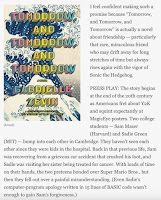'Reading' this book was completely unexpected and unintentional. It's definitely not a book I would normally pick up. I was forced to listen to the narration. Neither of us wanted to buy the Kindle copy or a paperback. The man borrowed Gabrielle Zevin's 'Tomorrow, and Tomorrow, and Tomorrow' (2022) from the library in audiobook format. He was most inconsiderate. He played it loud over the speakers at home, and in the car, forcing me to sit through good chunks of it. Anyway, this audiobook is narrated by Jennifer Kim and Julian Cihi. Then I hunted down a digital copy a friend had, and borrowed it to speed-read; to properly finish it. OMG. Audiobooks can be soooo tedious.
When I heard the title, I was like... huh? But there's nothing Macbeth about this book. This book celebrates forever, optimism and fun all the way through. "There would have been a time for such a word. // Tomorrow, and tomorrow, and tomorrow, // Creeps in this petty pace from day to day // To the last syllable of recorded time, // And all our yesterdays have lighted fools // The way to dusty death. // Out, out, brief candle!" (Macbeth Act 5 Sc 5).
A game's subtext is to lend superpowers to all gamers/players, and to erase mortality, isn't it? It's exactly what this book does. This is the author's tenth novel, and Paramount Pictures is making this book into a film. The author professes to be a "lifelong gamer". The Guardian's Pippa Bailey wrote,
When Macbeth soliloquises of “tomorrow, and tomorrow, and tomorrow”, he speaks of the relentlessness and futility of life. When Gabrielle Zevin employs the same words, she speaks of the “possibility of infinite rebirth, infinite redemption” offered by video games. In the virtual world, death is not the end and losing is but a chance to try again; there are endless chances, endless restarts. You do not have to be a gamer to see the appeal.The book spans thirty years, beginning at the turn of the 20th century. It explores all facets of friendship, of platonic friendship, if you will. It's not about gaming or gamers. It's honestly fairly complex, delving into the post pandemic world, if gaming could ease human suffering, moral complexity of ethics, gender equality, et cetera. If you ask me, this entire book is a world unto its own; it's a MMORPG.
This is the sort of book that I recognize as 'good' (interesting story, good plot with little loopholes, solid character development), but I don't fancy it because it's borderline too cerebral for me. (Reviews here, here, here, here and here.)
Protagonists Samson Masur (mathematics at Harvard) who changed his name to 'Sam Mazer', and Sadie Green (computer science at MIT) were college students when they met again as adults. They knew each other as kids who were in the hospital (one visiting, one had an amputated foot), but never kept in contact or struck up a deeper friendship till college because of a misunderstanding. They have always been friends, never actually romantic partners. They chase love, but not with each other. Sadie eventually married Marx and had a daughter with him. He got shot and died.
We go into the world of video games. 'Ichigo' came along, 'Mapletown', and Marx died, and the friendship between Sam and Sadie was more or less broken, again. 'Pioneers' was born. Through all these, their lives upended, their friendship put on pause, but never died. At the very end of the book, the story closed with Sam and Sadie being friends again. At the airport before they split to head home in separate cities, Sadie asked Sam, "Do you still game?" Sam replied, a bit too enthusiastically, "Of course." Sadie gave Sam a new game with a handwritten label. It said 'Ludo Sextus' — the Sixth Game, with the promise of tomorrow, of infinite possibilities and redemption.
There's the exploration of race (Sam is Asian-American), and the sense of un-belonging regardless of how bright the college kids are. There's also how game publishers said that Sam and Sadie's game 'Ichigo' with a female character lead wouldn't sell, and they should have as a 'he' lead the game. Then when they became legendary founders of a gaming company called 'Unfair Games', they have to struggle to decide on who does what, where would the credit be apportioned, et cetera. It's also a story about entrepreneurship and being fair.
The Washington Post's Ron Charles hit the nail on its head. He said,
The novel’s first demonstration of that possibility is Sadie’s chance to revive her ruined friendship with Sam now that they’re both college students. Over a copy of Richard Powers’s novel “Galatea 2.2,” the two estranged teens finally make up. “Promise me you’ll always forgive me, and I promise I’ll always forgive you,” Sadie says. And with an aura of prophecy, Sam says, “I see a future where we make fantastic games together.”
The tone here is decidedly romantic. “The way he saw it, he would be proposing to Sadie,” Zevin writes. “He would be getting down on one knee and saying, ‘Will you work with me?’” But this is not really a workplace romance; it’s a novel about the romance of work. Although Sam and Sadie love each other, they are never simultaneously in love with each other. And that’s clearly the point: Zevin is interested in portraying a creative partnership as intense as a marriage and as fraught as a marriage, but restricted to the conference room instead of a bedroom. And after all, what’s more extraordinary IRL? “Lovers are common,” Sadie realizes. “But true collaborators in this life are rare.”

No comments:
Post a Comment